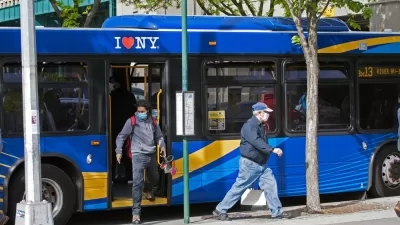With more people working from home since the pandemic, the area is seeing shorter commute times for cars and public transit.

In an article for WFAE, Tony Mecia describes how commutes in Mecklenburg County, North Carolina, home to Charlotte, have changed since before the Covid-19 pandemic.
Thanks to the sharp increase in remote work—triple the Charlotte residents work from home now than in 2019—commutes for those who do still go to a physical workplace are shorter. “In 2019, the average worker in Mecklenburg reported a commute to work of 26.7 minutes. In 2022, that average commute dropped to 24.4 minutes,” a 9 percent drop.
Another shift shows fewer people leaving for work early in the morning, with more people leaving home in the 8:00am hour, and traffic overall is more spread out throughout the day.
Over 80 percent of the county’s commutes take place in private vehicles. “Last year, the city of Charlotte set a goal that by 2040, it hopes to have what it calls a “50/50 mode share,” or have only 50% of commutes be people driving alone to work.”
FULL STORY: How Charlotte's commutes are changing: Shorter, later and fewer

Alabama: Trump Terminates Settlements for Black Communities Harmed By Raw Sewage
Trump deemed the landmark civil rights agreement “illegal DEI and environmental justice policy.”

Study: Maui’s Plan to Convert Vacation Rentals to Long-Term Housing Could Cause Nearly $1 Billion Economic Loss
The plan would reduce visitor accommodation by 25% resulting in 1,900 jobs lost.

Planetizen Federal Action Tracker
A weekly monitor of how Trump’s orders and actions are impacting planners and planning in America.

Wind Energy on the Rise Despite Federal Policy Reversal
The Trump administration is revoking federal support for renewable energy, but demand for new projects continues unabated.

Passengers Flock to Caltrain After Electrification
The new electric trains are running faster and more reliably, leading to strong ridership growth on the Bay Area rail system.

Texas Churches Rally Behind ‘Yes in God’s Back Yard’ Legislation
Religious leaders want the state to reduce zoning regulations to streamline leasing church-owned land to housing developers.
Urban Design for Planners 1: Software Tools
This six-course series explores essential urban design concepts using open source software and equips planners with the tools they need to participate fully in the urban design process.
Planning for Universal Design
Learn the tools for implementing Universal Design in planning regulations.
Caltrans
Smith Gee Studio
Institute for Housing and Urban Development Studies (IHS)
City of Grandview
Harvard GSD Executive Education
Toledo-Lucas County Plan Commissions
Salt Lake City
NYU Wagner Graduate School of Public Service





























